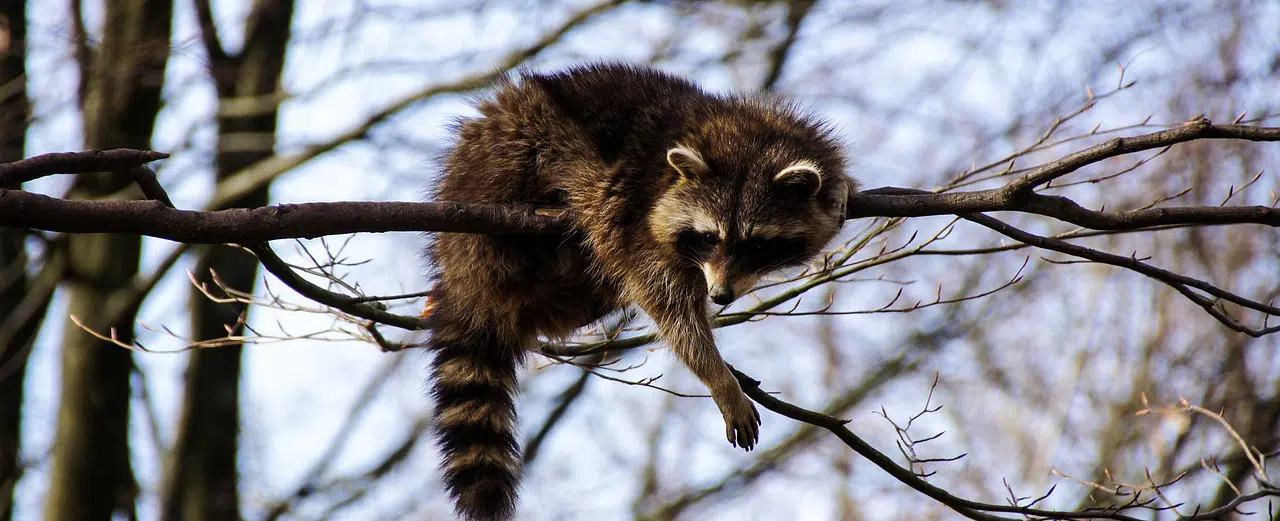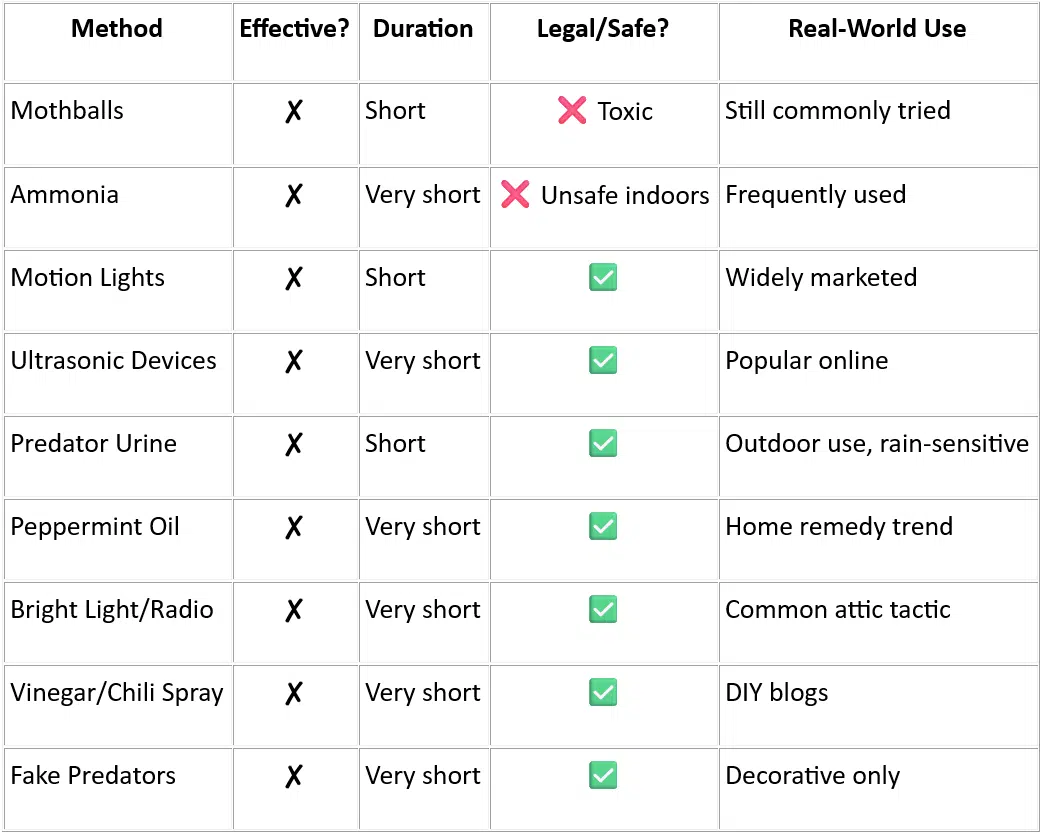Toronto, Vaughan, Mississauga and many other communities in the GTA report a growing number of raccoon intrusions. Often, our first impulse is to search online for what repels raccoons and for DYI solutions and home remedies. The Internet is full of suggestions on how to get rid of raccoons - but how well do these methods really work? And are they even legal or safe? *Spoiler Alert* Most of these crafty solutions offer false hope and very limited success, if any.

Do Raccoon Repellents Actually Work?
The short answer is no. Some home remedies have very short lived success but none of the populare DIY methods work long-term or solve the recurring raccoon problem.
Mothballs
- Why people try it:
The strong smell is thought to repel animals. - Reality:
Outdoors or in ventilated areas, the smell dissipates quickly. Raccoons usually ignore it. - Health concern:
Mothballs are classified as a pesticide and are toxic to humans and pets. They are illegal to use for wildlife in some provinces.
Ammonia-Soaked Rags or Open Containers
- Why people try it:
The scent of ammonia is believed to mimic predator urine or that strong fumes will cause discomfort. - Reality:
Ammonia proves only mildly effective for a few hours. The smell evaporates quickly or is washed away by rain. - Risk:
Inhaling ammonia indoors or in crawlspaces poses safety concerns.
Motion-Activated Lights or Sprinklers
- Why people try it:
Sudden movement or light may startle wildlife. - Reality:
Lights may work for a few nights at best, sprinklers are unlikely to work at all. Raccoons actually love water. Urban raccoons are smart and quickly learn to ignore such measures, especially when they’re used in predictable patterns or are poorly placed.
Commercial Ultrasonic Devices
- Why people try it:
They're often sold online and marketed as “eco-friendly” or “high-tech” pest deterrents. - Reality:
There's no credible scientific evidence that ultrasonic noise has a consistent effect on raccoons. They may initially react but adapt quickly. Again, they are highly intelligent and recognize quickly that these devices do not pose any physical danger.
Predator Urine (Coyote, Fox, etc.)
- Why people try it:
It is believed to trigger a strong fear response in raccoons. - Reality:
Raccoons in the GTA are not easily intimidated by scent alone—especially in high-traffic, food-rich areas like neighbourhoods or commercial dumpsters. - Exception:
The scent of a male raccoon WILL terrify a young mother with kits and she will move her offspring to a new site. - Short shelf life:
This requires constant reapplication; rain or humidity tends to render predator urine useless.
Peppermint Oil or Strong Essential Oils
- Why people try it:
These are common in natural or “green” DIY solutions. - Reality:
Essential oils may repel raccoons briefly in enclosed spaces (e.g., under a sink or crawlspace), but are mostly ineffective for attics, rooftops, chimneys, in large spaces, or outdoors. - False belief:
Many natural blogs promote this without proven results.
Bright Lights or Radios in the Attic
- Why people try it:
Raccoons prefer quiet, dark areas, so it makes sense that noise or light would discourage them. - Reality:
Noise or lights may delay entry or annoy them temporarily—but will not stop a raccoon already committed to nesting, especially one with babies. - Raccoon behaviour:
They will often move just a few feet away from the light and continue nesting.
Vinegar or Hot Pepper Spray
- Why people try it:
It's thought to irritate raccoons’ sensitive noses. - Reality:
These evaporate quickly, and outdoor use is almost entirely ineffective. Indoors, they can potentially damage surfaces and don’t provide lasting deterrence.
DIY “Scarecrow” or Fake Predator Models
- Example:
Owl Statues, Fake Snakes - Why people try it:
Visual scare tactics are inexpensive and easy to install. - Reality:
Raccoons ignore stationary decoys unless combined with sound or motion—and even then, they quickly adapt.

Why DIY Raccoon Repellents Rarely Work Long-Term
- Raccoons are incredibly intelligent problem-solvers and learn by observation - urban raccoons even more so.
- They’re territorial, persistent, and often have babies nearby (especially during the spring and early summer).
- DIY methods don’t address the entry point, nest site, or scent trail.
- Homeowners unintentionally train raccoons to ignore deterrents after repeated exposure.
The Dangers of Home Raccoon Deterrents and Remedies
- Toxic risks: Especially with mothballs and ammonia.
- False sense of security: Leads to property damage or baby raccoons being left behind.
- Human-wildlife conflict: Frustrated homeowners may resort to illegal or unsafe methods.
- Potential fines: Misuse of wildlife deterrents or illegal trapping and relocation in Ontario.
Why Trapping and Relocating Raccoons Isn’t the Solution
- Canadian wildlife law: Relocation is restricted to within 1 km of the capture site.
- Effectiveness: 99% of relocated raccoons will return if not removed permanently.
- Ethical/legal issue: Inadvertently separating a mother raccoon from her babies leads to starvation and suffering.
- Most raccoon and other wildlife control companies only perform temporary exclusion—raccoons often return later.
What Makes Hawkeye’s Permanent Raccoon Removal in Toronto Different
- Licensed to perform humane trapping and euthanasia—no other private company in the GTA offers permanent removal.
- Why euthanasia is effective: It prevents return and breaks the breeding/re-entry cycle.
- We call it "Permanent Removal"—because no other solution guarantees the raccoon won’t come back.
- Situational examples:
- A raccoon trapped and relocated in Mississauga returns to the same attic within 3 days.
- Raccoons in Vaughan repeatedly avoid one-way doors and other live traps due to familiarity. They have become trap-shy.
Is Permanent Removal More Humane Than Repellents?
- YES, when done professionally and legally.
- Permanent raccoon removal prevents:
- Repeated stress of re-entry and eviction
- Abandonment of babies
- Exposure to disease (roundworm, rabies) for humans and pets
- One time removal vs. months of trial-and-error suffering.
Conclusion: Stop Wasting Time on Temporary Fixes
DIY methods and home remedies to repel raccoons merely offer short-term hope and long-term frustration. End the endless cycle of trapping, releasing, and inevitably having to repeat when the released raccoons come back. Hawkeye Bird & Animal Control is the only company that offers legal permanent raccoon removal in the GTA - Don't just evict your raccoon, solve the problem for good - Contact us today!
Free estimates. Licensed professionals. Permanent results.
Serving Toronto, Vaughan, Newmarket, Mississauga, Oakville, Brampton, Markham, Oshawa, and beyond.














